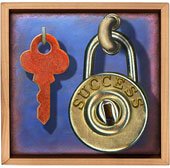In recent times the media has been full of doom and gloom in its reporting of the global economic situation. From East to West and from North to South, across the globe, economies are strained. The average person has been hit in his pocket as financial markets, large corporate organisations, banking institutions, the real estate market, et al, struggle. Now the situation of threatening global recession is real; and for many people, their thinking has been impacted on negatively as they are forced to "tighten their belts" and "shore-up". Of course, it is no secret that we act out what we think and thus it follows that those with negative (I'm not going to define this at all) thoughts in these times act defensively, with fear, short of creative energy, etc.
Whether it is the economy, one's health, relationships, career or any other area of one's life, to think negatively (in the face of challenge) will lead to negative behaviour and this yields less than optimum results.
Another reality is that "we live in a thought world, which is part of a thought universe" (WD Wattles - The Science of Getting Rich"). Also, the way one does things is directly proportional to the way one thinks about things. For us to get the results that we want, in the face of what may seem to be insurmountable obstacles, requires us to act in a certain way and that in turn requires us to think in that certain way. Regardless of appearance of circumstances, one has to think the result that one desires and hold an unwavering image of that result. To think anything else other than what one desires will diminish the manifestation of the desired result. There is volumes to be said about this truth and maybe we will return to it sometime.
Vitually all limitation is self-imposed. We each are an expression of the Creator of all things and consequently we have no limitations other than those which we accept in our minds. Despite the condition of the world that we live in, opportunity abounds and the world is still a world of abundance. Classical economics has taught us the law of scarcity and thus we think scarcity (not just financially but in most areas of our lives) the minute we experience the slightest degree of constraint. Fear and ignorance work together to rob us of seeing opportunity. The mind is like a fertile field - it will yield a crop of anything that we plant in it. Our thoughts produce tangible results and they have a significant and long term effect on our lives. What we think upon grows. Harvard psychologist, William James, said; "You are what you think think about most of the time".
If the above is true (and it is true), then it is of great importance that we learn to control our thoughts. I've borrowed some ideas from Napolean Hill's "Think and Grow Rich" as to how we could possibly learn to control our thoughts.
1. Use or Lose - simply put, practice makes perfect. Thought control is a function of intelligent practice.
2. Law of Correspondence - first the internal then the external. Watch what you think and feel and consciously make efforts to change the way you view things.
3. Law of Substitution - the only way to rid oneself of a particular thought is to replace it with another thought.
4. Law of Belief - believe without doubting is the principle. Develop positive expectancy.
5. Law of Attraction - surround yourself with positive people and avoid anything that may breed negative in your life.
6. Law of Compensation - become a giver and you will receive. Give freely, give with joy and give without expecting a return.
Remember that our thoughts are "now things". Our future is in our now. Let me conclude with these quotations:
"People are always blaming their circumstances for what they are. I don't believe in circumstances. The people who get on in this world are those who get up and look for the circumstances they want - and if they can't find them, they make them". - George Bernard Shaw
"Now faith is being sure of what we hope for and certain of what we do not see" - Hebrews 11:1 (NIV Bible)
"Our doubts are traitors, and make us lose the good we oft might win, by fearing to attempt" - William Shakespeare
Feb 26, 2009
Subscribe to:
Posts (Atom)



